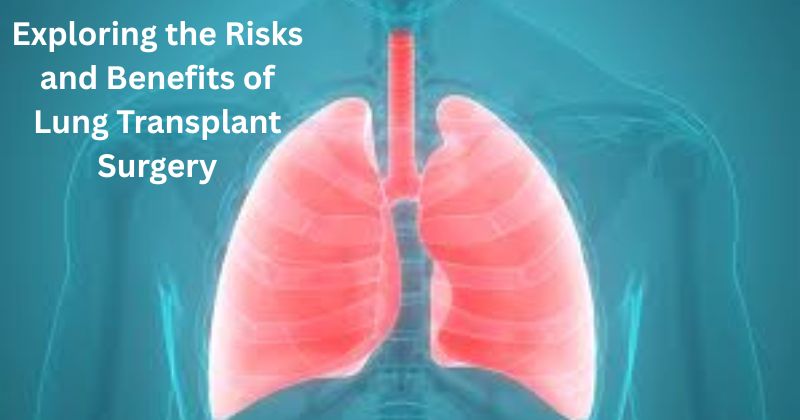Exploring the Risks and Benefits of Lung Transplant Surgery
Lung transplant surgery is a life-saving procedure that offers hope to patients suffering from severe Lung Diseases such as chronic obstructive pulmonary disease (COPD), pulmonary fibrosis, or cystic fibrosis. However, like all major surgeries, a lung transplant comes with its own set of risks and benefits. Understanding both is crucial for anyone considering this life-changing procedure.
Benefits of Lung Transplant Surgery
- Improved Quality of Life: One of the most significant benefits of lung transplant surgery is the improvement in quality of life. Patients often experience increased energy, better lung function, and the ability to engage in daily activities that were previously difficult due to respiratory issues.
- Extended Life Expectancy: For many individuals with terminal lung diseases, a lung transplant can provide a chance to extend life expectancy. With a successful procedure, patients may live for many more years, free from the debilitating symptoms of their previous condition.
- Restoration of Normal Respiratory Function: A lung transplant can restore normal breathing patterns, alleviating the symptoms of shortness of breath, chronic cough, and fatigue that often accompany advanced lung diseases. This can have a profound impact on both physical and emotional well-being.
- Opportunity for a Fresh Start: For many, the thought of a new set of healthy lungs offers a sense of hope and a fresh start in life. The emotional relief of knowing that there is a way to overcome the limitations of their lung disease can be a powerful motivator for patients.
Risks of Lung Transplant Surgery
While lung transplants offer significant benefits, they are not without risks. It’s important to be aware of potential complications before proceeding with the surgery.
- Rejection of the New Lungs: One of the major risks of lung transplant surgery is the rejection of the transplanted organs. The body’s immune system may recognize the new lungs as foreign and attack them. To prevent rejection, patients must take immunosuppressant medications, which also carry their own set of risks.
- Infection: Post-transplant patients are more vulnerable to infections due to the use of immunosuppressive drugs. These medications lower the body’s ability to fight infections, making them more susceptible to bacterial, viral, or fungal infections that can be life-threatening.
- Chronic Rejection: Over time, some transplant recipients may experience chronic rejection, where the transplanted lungs gradually lose function. This condition can be difficult to manage and may lead to the need for another transplant.
- Surgical Complications: As with any major surgery, lung transplant procedures carry risks such as bleeding, blood clots, and anesthesia complications. Additionally, the surgery itself can be physically taxing, especially for those who have already been weakened by advanced lung disease.
- Side Effects of Medication: Immunosuppressants and other medications used after lung transplant surgery can have side effects, including kidney damage, high blood pressure, and diabetes. Managing these side effects requires careful monitoring by healthcare professionals.
Lung Transplant Survival Rate
The lung transplant survival rate is an important factor for anyone considering the procedure. Research shows that the 1-year survival rate for lung transplant recipients is approximately 80-85%, while the 5-year survival rate tends to range between 50-60%. These numbers can vary depending on several factors such as the patient’s age, overall health, and the quality of the donor lungs.
Advances in transplant surgery and post-operative care have significantly improved survival rates over the years, offering renewed hope for many patients. However, ongoing medical care and adherence to medication regimens are essential to maintaining these positive outcomes.
Lung Transplant Cost in Arabia
The cost of a lung transplant is a significant consideration for many patients, particularly in regions like Arabia. Lung transplant costs in Arabia can vary widely depending on the country, hospital, and specific medical needs of the patient. Generally, the total cost of the procedure, including surgery, hospital stay, medications, and follow-up care, can range from $100,000 to $200,000 or more.
Additionally, post-transplant care can add further costs due to the need for lifelong medication, regular check-ups, and potential treatments for complications. It is essential for patients and families to work closely with healthcare providers and financial advisors to understand the costs and explore available insurance options or financial assistance programs.
Conclusion
Lung transplant surgery presents a complex balance of risks and benefits. On one hand, it offers the possibility of a significantly improved quality of life and extended life expectancy for patients with severe lung disease. On the other hand, it carries risks such as organ rejection, infections, and the need for lifelong medication.
Understanding the lung transplant survival rate and the lung transplant cost in Arabia is essential for anyone considering this life-changing procedure. It is crucial to have open discussions with medical professionals to assess whether a lung transplant is the right option based on individual health conditions and circumstances.
for more(click here)
